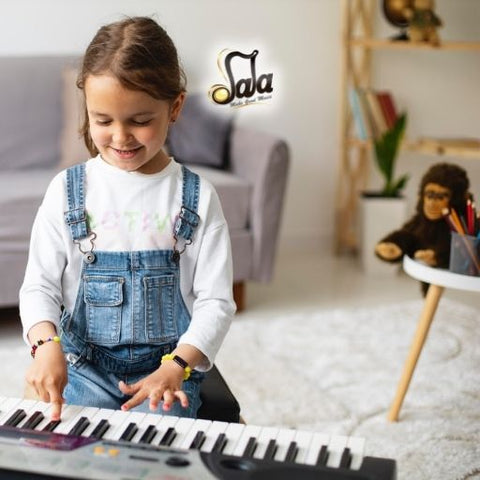Why Kids Should Learn to Play an Instrument: The Benefits of Music Education
Music education is an incredibly valuable experience for children, and learning to play a musical instrument is one of the most rewarding parts of that education. Not only is playing an instrument an enjoyable pastime, but it also offers many benefits for children's mental and emotional development. In this blog post, we'll explore the reasons why kids should learn to play an instrument, the benefits of playing a musical instrument for children, and how to choose the right instrument for your child.

There are many reasons why children should learn to play an instrument. Here are just a few of the benefits of music education:
Cognitive Development: Learning to play an instrument can improve a child's cognitive abilities, including memory, spatial reasoning, and language skills. This is because playing an instrument requires a child to use multiple parts of their brain at once.
Emotional Development: Playing an instrument can help children express their emotions and develop emotional intelligence. Music can also be a calming and therapeutic outlet for children who are dealing with stress or anxiety.
Discipline and Responsibility: Learning to play an instrument requires practice and discipline. Children who learn to play an instrument develop a sense of responsibility and commitment, which can benefit them in other areas of their lives.
Social Skills: Playing an instrument can also improve a child's social skills. Joining a band or orchestra can teach children how to work as a team and collaborate with others towards a common goal.
Creativity: Playing an instrument encourages creativity and self-expression. It can also inspire children to explore other forms of art and creative expression.

Benefits of Playing a Musical Instrument for Children
In addition to the benefits of music education listed above, there are many specific benefits to playing a musical instrument. Here are a few:
- Improved Coordination: Playing an instrument requires hand-eye coordination, finger dexterity, and good posture. Practicing these skills can improve a child's overall coordination and fine motor skills.
- Better Academic Performance: Studies have shown that children who play a musical instrument often perform better in school, especially in subjects like math and science.
- Increased Confidence: Learning to play an instrument can boost a child's self-esteem and confidence. Mastering a difficult piece of music or performing in front of an audience can be incredibly empowering for a child.
- Stress Relief: Playing an instrument can be a great way for children to relieve stress and unwind. It can also help children cope with difficult emotions like anger or sadness.

Which Instrument Should My Child Learn?
Choosing the right instrument for your child can be a daunting task. Here are a few things to consider:
Your Child's Personality: Think about your child's personality and interests when choosing an instrument. If your child is outgoing and loves attention, they might enjoy playing the drums or the trumpet. If they are more introverted and prefer a quieter activity, they might prefer playing the piano or the violin.
Physical Ability: Consider your child's physical abilities when choosing an instrument. For example, if your child has a small frame or limited mobility in their hands, they might find it difficult to play a larger instrument like the guitar.
Availability and Cost: Some instruments are more expensive or harder to find than others. Consider your budget and the availability of lessons and instruments in your area.
Your Child's Musical Goals: Ask your child what they hope to achieve through music education. Are they interested in playing in a band or orchestra, or do they simply want to learn for fun? This can help you choose an instrument that will meet your child's musical goals.
In conclusion, learning to play a musical instrument can be an incredibly valuable experience for children. It offers many cognitive, emotional, and social benefits, as well.
You Can Also Like: The Psychological Benefits of Playing a Musical Instrument





Hinterlassen Sie einen Kommentar